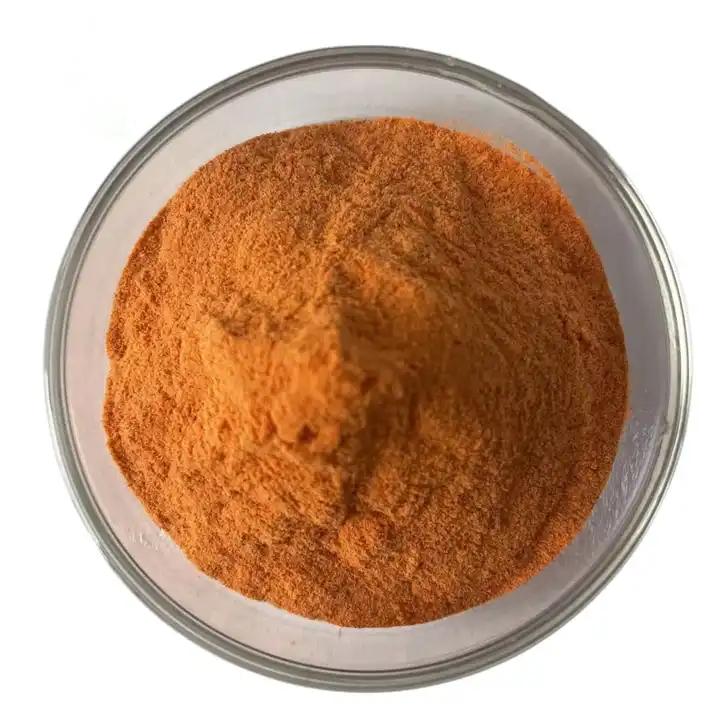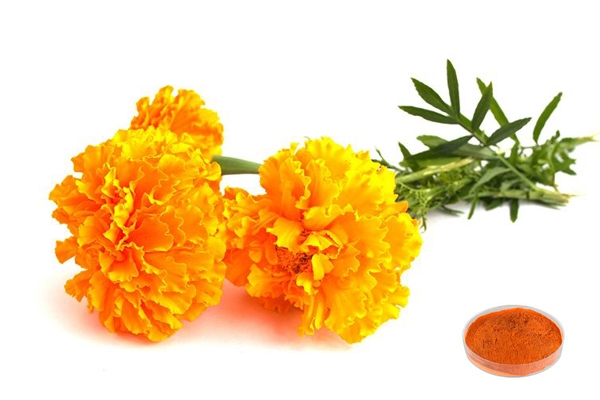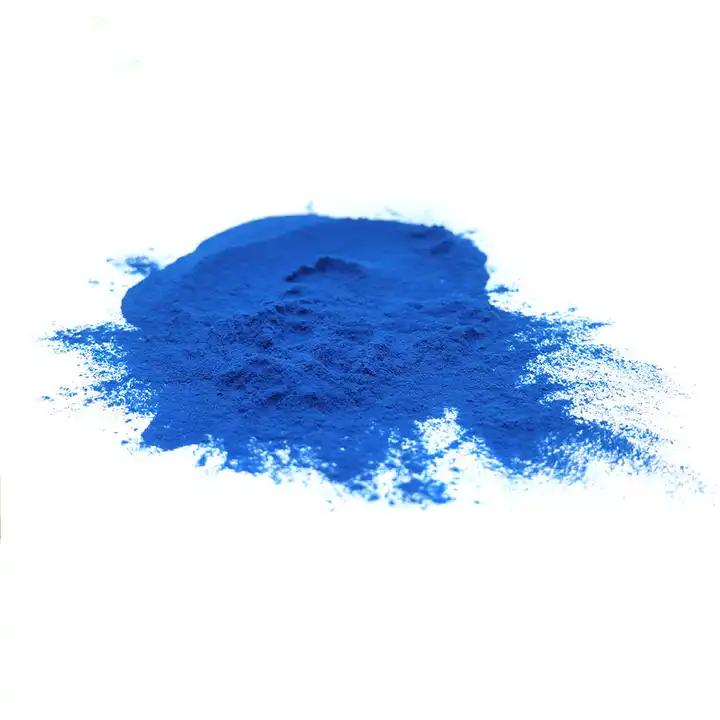Extrait de fleur de souci lutéine en poudre 80% vrac
Nom de produit :Marigold Flower Extract
Source végétale: fleur de Marigold
CAS non. Numéro de téléphone :127-40-2
Analyse: 80%
Méthode d’essai :HPLC
Apparence: poudre Fine Orange
Résidu de Pesticide: conforme à la norme (ce) No 396/2005
- Description Description
- Fiche technique
- Certificat de formation
-
Qu’est-ce que la poudre de lutéine d’extrait de fleur de souci?
La lutéine est une vitamine liposoluble qui appartient à la famille des caroténoïdes....... La lutéine se trouve dans la nature avec la zéaxanthine (zéaxanthine). La lutéine et la zéaxanthine sont les principaux composants des pigments végétaux qui composent le maïs, les légumes, les fruits et les fleurs, ainsi que les principaux pigments qui composent la région maculaire de l’œil humain.#39; S rétine.
Extrait de fleur de souci lutéine en poudre is the active ingredient La lutéine extracted from Fleur de souci, which is an orange-yellow powder. Marigold flowers are high in lutein. The human eye contains high levels of lutein and zeaxanthin, but these two elements cannot be produced by the human body and need to be supplemented by foods containing lutein and zeaxanthin.
Green Spring Technology fournit une poudre de lutéine d’extrait de fleur de souci de haute pureté, qui est faite à partir de fleur de souci, à travers les étapes de déshydratation et de broyage, d’extraction au solvant, de purification d’alcool à faible poids moléculaire et de concentration sous vide. Il a la stabilité et la solubilité de haute qualité et bonnes.
Green Spring Technology organise sa production dans le strict respect des normes de qualité ISO, HACCP et autres. Toutes les marchandises que nous fournissons répondent aux normes internationales de la pharmacopée européenne, de la pharmacopée américaine, de la pharmacopée japonaise et ainsi de suite. Nous avons passé Halal, casher, COSMOS, BRC, IFS, FDA, ISO et beaucoup d’autres certifications. Le printemps vert a une excellente équipe de r & D, une équipe de production expérimentée et une équipe de vente professionnelle, nous pouvons personnaliser toutes sortes d’extraits standard et d’extraits proportionnels. Nous pouvons fournir des rapports des essais faisant autorité de tiers.
Spécification:
Nom du produit
Extrait de fleur de souci
Nom Latin
Tagetes Erecta l.
CAS non.
127-40-2
Source:
Marigold Flower
Ingrédients actifs
Lutein
analyse
80% de la population
Méthode d’essai
HPLC/HPLC
apparence
Poudre Fine Orange
Résidus de pesticides
Conforme à la norme (ce) n ° 396/2005
Règlement:
Il est conforme à la réglementation de l’ue.
Learn More About Our Fully Compliant, Consistent, Traceable Natural Lutein Ingredient Comprehensive Solution.
Vous cherchez un devis?Benefits:
Antioxidant
Marigold flower extract lutein has antioxidant properties, which can reduce oxidative stress in retinal tissues, protect retinal cells, reduce visual damage, and protect vision. For a normal population, proper intake of lutein powder can have a protective and supportive effect on eye health, while lutein deficiency may cause retinal damage and vision loss.
Filtering Blue Light
Blue light can penetrate the eyeball and damage the retina and macula, especially the fatty outer layer of the macula is susceptible to light damage, so this area is highly susceptible to degeneration. Marigold flower extract lutein powder has the effect of absorbing blue light. Its special near blue-violet light absorption spectrum helps the retinal tissues of the eye to protect against UV damage from the outside world.
Reduce the Risk of Chronic Diseases
Lutein can inhibit the oxidation of LDL-C through antioxidant action, thus delaying the formation of arterial plaque, preventing atherosclerosis, and reducing the incidence of cardiovascular disease. Epidemiological studies have shown that changes in LDL-C levels and the thickness of the middle intima-media of the main carotid artery vessels are inversely proportional to serum lutein content. Dietary lutein powder intake, and blood or adipose tissue levels of lutein are negatively correlated with the risk of cardiovascular disease.
Mechanisms of tumour suppression by lutein may include antioxidant, immunomodulation, inhibition of tumour vascular proliferation and cell proliferation, promotion of tumour cell differentiation and reduction of its malignancy. A meta-analysis of 88,410 study participants showed that lutein powder intake was negatively associated with the risk of non-Hodgkin's lymphoma; an increase of 1 μgmol/L of lutein in the blood decreased the risk of bladder cancer by 56%. Premenopausal women with high levels of lutein intake (16.5mg/d) had a 17 per cent lower risk of breast cancer compared with the low-level group (3.8mg/d).
Lutein may reduce the risk of developing type 2 diabetes. A randomly selected group of 1597 Australian adults aged 25 years and older were followed up for 2 months, and the results showed that serum lutein levels were inversely associated with type 2 diabetes and impaired glucose tolerance and that intake of lutein-rich fruits and vegetables reduced the risk of developing type 2 diabetes.
Anti-tumour
In recent years, domestic and foreign studies have found that lutein from marigolds flower extract has the effect of inhibiting tumour cells such as colon cancer, liver cancer, breast cancer, gastric cancer and oesophageal cancer. Relevant studies have shown that the anti-tumour effect of lutein is mainly achieved through its inhibition of tumour cell proliferation and induction of differentiation, induction of tumour cell apoptosis, immunomodulation and antioxidant activity.
Studies have shown that lutein can inhibit the proliferation of esophageal cancer EC9706 cells and induce apoptosis of EC9706 cells to a certain extent. Studies on the inhibitory effect of luteolin on the proliferation of human hepatocellular carcinoma HepG2 cells and the related molecular mechanisms revealed that luteolin could affect the transcriptional expression of AP-1, p53, and caspase-3 genes as well as the expression of apoptosis-related proteins, and thus inhibit the proliferation of hepatocellular carcinoma HepG2 cells. In addition, two flavonoids extracted from the stem and leaves of marigold could inhibit the proliferation of human gastric cancer cells SGC7901 and human hepatocellular carcinoma cells SMMC7721, and their in vitro anti-hepatocellular carcinoma and anti-gastric carcinoma activities were confirmed.
Applications:
In the Food Field:
In 2008, China's Ministry of Health (MOH) document No. 12 approved lutein ester (chemical name: lutein palmitate) as a new food ingredient, with a daily use level of ≤12 mg/day; the scope of use includes bakery products, dairy products, beverages, ready-to-eat cereals, frozen beverages, flavorings, and confectionery, but excludes foods for infants and young children. Marigold flower extract lutein powder is used in China as a food additive in many food categories such as dairy products, biscuits, and beverages.
For Feed Product:
On 9 March 2021, the European Union issued Regulation (EU) 2021/420 approving the use of lutein-rich and lutein/zeaxanthin extracts from Tagetes erecta as feed additives for the fattening and laying of poultry (except turkeys) and the fattening and laying of small poultry.
Marigold flower extract lutein powders were used for chicken fattening and small poultry fattening, hen laying and small poultry laying at a maximum level of 80 mg/kg of total carotenoids in a 12% water content full-price feed; lutein/zeaxanthin extracts were used for chicken fattening and small poultry fattening, hen laying at a maximum level of 80 mg/kg of total carotenoids in a 12% water content full-price feed, and for small poultry laying at a maximum level of 50 mg/kg.
-
Get Your Free COA
-
Télécharger le document
Cosmos Green Spring Technology
Télécharger le documentHalal Green Spring Technology
Télécharger le documentKosher Green Spring Technology


 Anglais
Anglais français
français espagnol
espagnol russe
russe coréen
coréen japonais
japonais













